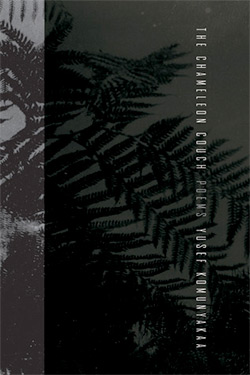The Chameleon Couch
by Yusef Komunyakaa
reviewed by Henry Hughes
In his fourteenth poetry collection, Yusef Komunyakaa has the ease and mastery of a long-seasoned writer and the exuberance of someone as bold and fresh as he is curious and unsure. “Is this why some of us fall / in & out of love?” he ponders in a poem about the “brass & flesh” of a blues club. In a warm, vernacular voice that often soars to dizzying intellectual and poetic strata, Komunyakaa shares powerful experiences that take us to the bar, street, bedroom, kitchen, and across the planet—his image-rich, verbal music moving in and out of brilliant confusion like the blues and jazz he loves. As the title suggests, this book also continues the poet’s long fascination with optical phenomena—chameleons, mirages, mirrors, disguises, and decoys—that offer multiple views of our complex world.
In the supple “A Translation of Silk,” we again find Komunyakaa’s terse three- and four-beat lines and the familiar moves from a sensuously felt object to the brutal trail of history and the inevitable lessons that must be uttered to be learned.
One can shove his face against silk
& breathe in centuries of perfume
on the edge of a war-torn morning
where men fell so hard for iron
they could taste it.
By embracing the “leafy pagoda / printed on slow cloth,” a broken man finds that the woven suggestions of natural survival—beginning with leaves and silk worms—are greater than the human conceit of art’s immortality.
I need to trust
this old way of teaching a man
to cry, & I want to believe in
what’s left of the mulberry leaves.
Humans crave immortality, but oh,
yes, to think worms wove this
as a way to stay alive in our world.
The expression “I need to trust” characterizes the open, vulnerable, passionate conversation Komunyakaa has with his readers, made famous in Copacetic (1984) and Dien Cai Dau (1988). Recalling lines from his widely anthologized Vietnam Memorial poem, “Facing It,”—“I said I wouldn’t / dammit. No tears”—we hear the poet’s resolve not to let go of his emotions, in this case over the seductive sweetness of black figs: “Because they tasted so damn good, I swore / I’d never eat another one.” In the love poem, “Canticle,” he pleads, “Because I mistrust my head & hands, because I know salt / tinctures my songs, I tried hard not to touch you.” And in “Surrender” a distraught lover calls to the muses Leadbelly, Robert Johnson, and Sam Cook, begging “Somebody, some naked Ishtar of fusion / & war, please tell me I am addle-headed / as Caliban’s sleepwalking apprentice.” Perhaps this doubt is key to understanding Komunyakaa’s journey—despite all the sweet fruit, steamy sex, and soulful music celebrated in this book, danger and defeat always pull at the spirit. “I know laughter can rip / stitches, & deeds come undone in the middle of a dance,” he says in “Black Figs.” A universal human anxiety? Yes. But this is also about being an African-American artist in America. The last stanza in the poem “Poppies” openly declares
I am a black man, a poet, a bohemian,
& there isn’t a road my mind doesn’t travel.
I also have my cheap, one-way ticket
to Auschwitz & know of no street or footpath
death hasn’t taken. The poppies rush ahead,
up to a cardinal singing on barbed wire.
Komunyakaa’s poetry affirms the joys of being human, but also bares the dread of human hate and destruction—not surprising for a man who has experienced war in Southeast Asia, racially driven discrimination and violence in America, as well as murder and suicide in his own family. Although art gives us the opportunity to imaginatively experience what it’s like to live in a different skin, we’ll never really know what it is to be the other. In “Dead Reckoning,” he writes:
Forbidden
laughter of the mermaids fills the night,
& if humans try to sing this laughter,
their voices only cry out in the dark.
Chameleon Couch, like much of Komunyakaa’s work, exposes the realities, advantages, and sins of social camouflage. In “Ten or Eleven Disguises” the speaker watches a woman on a train applying makeup.
Does she know powder can’t erase Africa
or the snip of an eyelid transform Asia?
Can she see our ancestor holding his little bow
& bone-tipped arrow to bring down a wildebeest
In contrast, Yusef Komunyakaa has removed his makeup, whether it’s an American name or a professor’s beard. Born James William Brown, the poet reclaimed the name Komunyakaa from his grandfather who emigrated to the States from Trinidad.
In Chameleon Couch’s final poem, “Ontology & Guinness,” the poet rediscovers his old face in an Obama election celebration.
I’m a man of my word.
Didn’t I say, If Obama’s elected,
I’ll shave off this damn beard
that goes back to ’68, to Chicago?
Remembering a younger man of protests, tear gas, billy clubs, but also the joys of dancing and the rhythms of Led Zeppelin and Alan Watts, Komunyakaa’s sense of identity playfully pours itself into a glass of stout.
The older I get
the quicker Christmas comes,
but if I had to give up the heavenly
taste of Guinness dark, I couldn’t
live another goddamn day. Darling,
you can chisel that into my headstone.
Published on March 18, 2013

